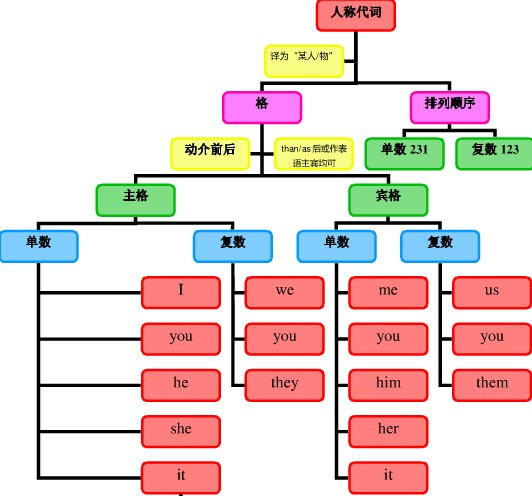本试题 “This is not my story, nor ______ the whole story. My story plays out differently.[ ]A. is thereB. there isC. is itD. it is” 主要考查您对人称代词
部分倒装
等考点的理解。关于这些考点您可以点击下面的选项卡查看详细档案。
- 人称代词
- 部分倒装
人称代词的概念:
人称代词是替代我、你、他、她、它、我们、你们、他们、她们、它们等人称的词。
人称代词分为主格和宾格形式,并有人称的单复数形式。按所替代人称的不同分为第一人称、第二人称和第三人称。
人称代词的用法:
人称代词在句中可以用作主语(用主格,如:I,you,he,she,we,they,等)和宾语(用宾格,如 me,you,him,her,us,them等)
如:He loves her, but she hates him. 他爱她,但她却讨厌他。
注:(1)在口语中,当人称代词用作表语、用于than, as之后或用于强调句中被强调时,可以用语。 例如:
"Who is it?" "It's me."“是谁呀?”“是我。”
He sings better than me. 他比我唱得好。
He is as tall as her. 他和她一样高。
It's me who did it. 这是我干的。但是,若than,as后的人称代词后跟有动词,则必须用主格。例如:
He sings better than I do./ He is as tall as she is.
(2)单独使用的人称代词通常用宾格。
"I' m tired.""Me too."“我累了。”“我也累了。”
"Who wants this?" "Me."“谁要这个?”“我要。”
(3)有时用主格或宾格会导致意思的变化。
I like you better than he. 我比他更喜欢你。为 I like you better than he likes you. 之略。
I like you better than him. 我喜欢你胜过喜欢他。为 I like you better than he likes him. 之略。
人称代词主格、宾格、人称、单复数对比:
|
人称代词 |
单数 |
复数 | ||
|
主格 |
宾格 |
主格 |
宾格 | |
|
第一人称 |
I |
me |
we |
us |
|
第二人称 |
you |
you |
you |
you |
|
第三人称 |
he |
him |
they |
them |
|
she |
her |
them | ||
|
it |
it | |||
人称代词的排序:
人称代词的排列顺序为:单数人称代词通常按“二三一”排列,即you, he and I;复数人称代词通常按“一二三”排列,即we, you and they:
You, he and I are of the same age. 你,他和我都是同一年龄。
We, you and they are all good citizens. 我们,你们和他们都是好公民。
但若是用于承担责任或错误等场合,则可把第一人称I置于其他人称代词之前:
I and Tom are to blame. 我和汤姆该受批评。
比较:Tom and I hope to go there. 汤姆和我想去那儿。
注意:you and I 是固定结构,语序通常不宜颠倒。
人称代词知识体系:

人称代词用法拓展:
1、在通常情况下,人称代词在句子中出现在它所代替的名词之后,即先出现名词,再出现相应的代词。但是,在书面语中,有时也可出现代词,后出现代词所代替的名词。
As soon as it had hopped off, the plane picked up speed.飞机刚一起飞,就加了速。
(比较:As soon as the plane had hopped off, it picked up speed.)
2、人称代词后跟名词同位语。有些人称代词后有时可跟同位语。
These small desks are forus students.这些小课桌是给我们学生的。
We girls often go to the movies together.我们女孩子常一起去看电影。
He asked you boys to be quiet.他要你们男孩子安静些。
部分倒装的概念:
倒装英语句子的主语通常位于谓语动词之前,这种语序被称为正常语序。但有时出于修辞或某种特殊的语法结构的需要,需要将谓语动词放在主语之前,这种语序则叫倒装语序。主语和助动词倒置叫部分倒装。
部分倒装:
1、含有否定意义的副词位于句首时的倒装:
在正式文体中,never, seldom, rarely, little, hardly, scarcely, no sooner, no longer, nowhere等含有否定意义的副词若位于句首,则其后要用部分倒装:
如:I shall never forgive him./ Never shall I forgive him. 我永远不会宽恕他。
He seldom goes out for dinner./Seldom does he go out for dinner. 他很少出去吃饭。
She hardly has time to listen to music./Hardly does she have time to listen to music. 他几乎没时间听音乐。
He little realize show important this meetingis./Little does he realize how important this meeting is. 他不甚明白这个会议的重要性。
We had no sooner reached the airport than the plane took off./No sooner had we reached the airport than the plane took off. 我们刚到机场,飞机就起飞了。
注:(1)对于not…until句型,当not until…位于句首时,其后的主句要用倒装语序:
如:He didn't leave the room until the rain stopped./Not until the rain stopped did he leave the room. 雨停了之后他才离开这房间。
(2)某些起副词作用的介词短语,由于含有否定词,若位于句首,其后要用部分倒装:
如:On no accounts must this switch be touched. 这个开关是绝不能触摸的。
In[Under] no circumstances will I lend money to him. 无论如何我也不会再借钱给他了。但是,in no time(立即,马上)位于句首时,其后无需用倒装语序:
如:In no time he worked out the problem. 他马上就算出了那道题。
2、“only+状语”位于句首时的倒装:
当一个状语受副词only的修饰且置于句首时,其后用部分倒装语序:
如:Only then did he realize that he was wrong. 到那时他才意识到他错了。
Only in this way are you able to do it well. 你只有用这种方法才能把它做好。
Only when he returned home did he realize what had happened. 当他回到家里时,才知道出了什么事。
3、“so+形容词或副词”位于句首时的倒装:
副词so后接形容词或副词位于句首时,其后用部分倒装:
如:So cold was the weather that we had to stay at home. 天气太冷,我们只好呆在家里。
So fast does light travel that we can hardly imagine its speed. 光速很快,我们几乎没法像它的速度。
So sudden was the attack that we had no time to escape. 袭击来得非常突然,我们来不及逃跑。
4、“So+助动词+主语”倒装:
当要表示前面提出的某一肯定的情况也同样适合于后者,通常就要用“So+助动词+主语”这种倒装结构:
如:You are young and so am I. 你年轻,我也年轻。
She likes music and so do I. 她喜欢音乐,我也喜欢。
If he can do it, so can I. 要是他能做此事,我也能。
注:(1)若前面提出某一否定的情况,要表示后者也属于同样的否定情况,则应将其中的so改为neither或nor:
如:You aren't young and neither am I. 你不年轻,我也不年轻。
She hasn't read it and nor have I. 她没有读它,我也没有读。
(2)注意该结构与表示强调或同意的“so+主语+特殊动词”结构的区别:
如:"It was cold yesterday." "So it was."“昨天很冷。”“的确很冷。”
"Father, you promised." "Well, so I did."“爸爸,你答应过的。”“嗯,是答应过。”
5、由not only…but also引出的倒装:
当not only…but also位于句首引出句子时,not only后的句子通常用部分倒装形式:
如:Not only is he a teacher, but he is also a poet. 他不仅是一位教师,而且是一位诗人。
Not only did he speak more correctly, but he spoke more easily. 不仅他讲得更正确,也讲得更不费劲了。
6、虚拟条件句省略if后构成的倒装:
当if引导的虚拟条件从句中含有had, were, should等时,如将if省略,则要将had, were, should等移到主语前,构成倒装句:
如:Had you come yesterday, you would have seen him. 若你昨天来,你就会见到他了。
Should you require anything give me a ring. 如果需要什么,可以给我打电话。
Were it not for your help, I would still be homeless. 要不是你帮助,我会仍然无家可归。
注:省略if后提前的had不一定是助动词:
如:Had I money, I would buy it. 假若我有钱,我就会买它。
与“This is not my story, nor ______ the whole story. My stor...”考查相似的试题有:
- ----When can we go to visit you?---- Anytime you feel like ______.A.oneB.itC.thatD.so
- We've been looking for a cheap house but haven't found ________ yet.A.oneB.otherC.itD.that
- The color of my coat is different from ____ of yours.A.thisB.thatC.itD.one
- I'm moving to the countryside because the air there is much fresher than _______ in the city.A.onesB.oneC.thatD....
- ___the people have become the master of their own country___science can really serve the people.A.It is only t...
- ----- Do you have ______ bananas?-----Yes, I have_____.A.some, anyB.some, someC.any, someD.any, any
- Only when _____ how important it is to master English.[ ]A. did I work I realizedB. I worked did I realizeC. did I wo...
- Only when he met the girl his aunt introduced to him ____ that he had seen her before.A.he realizedB.he did realize...
- Never______ such a difficult problem. It took me almost half an hour to work it out.A.had I come acrossB.I had come...
- _________ rubbish did I throw onto the floor that there was no room for people to get past.A.So littleB.Too littleC...